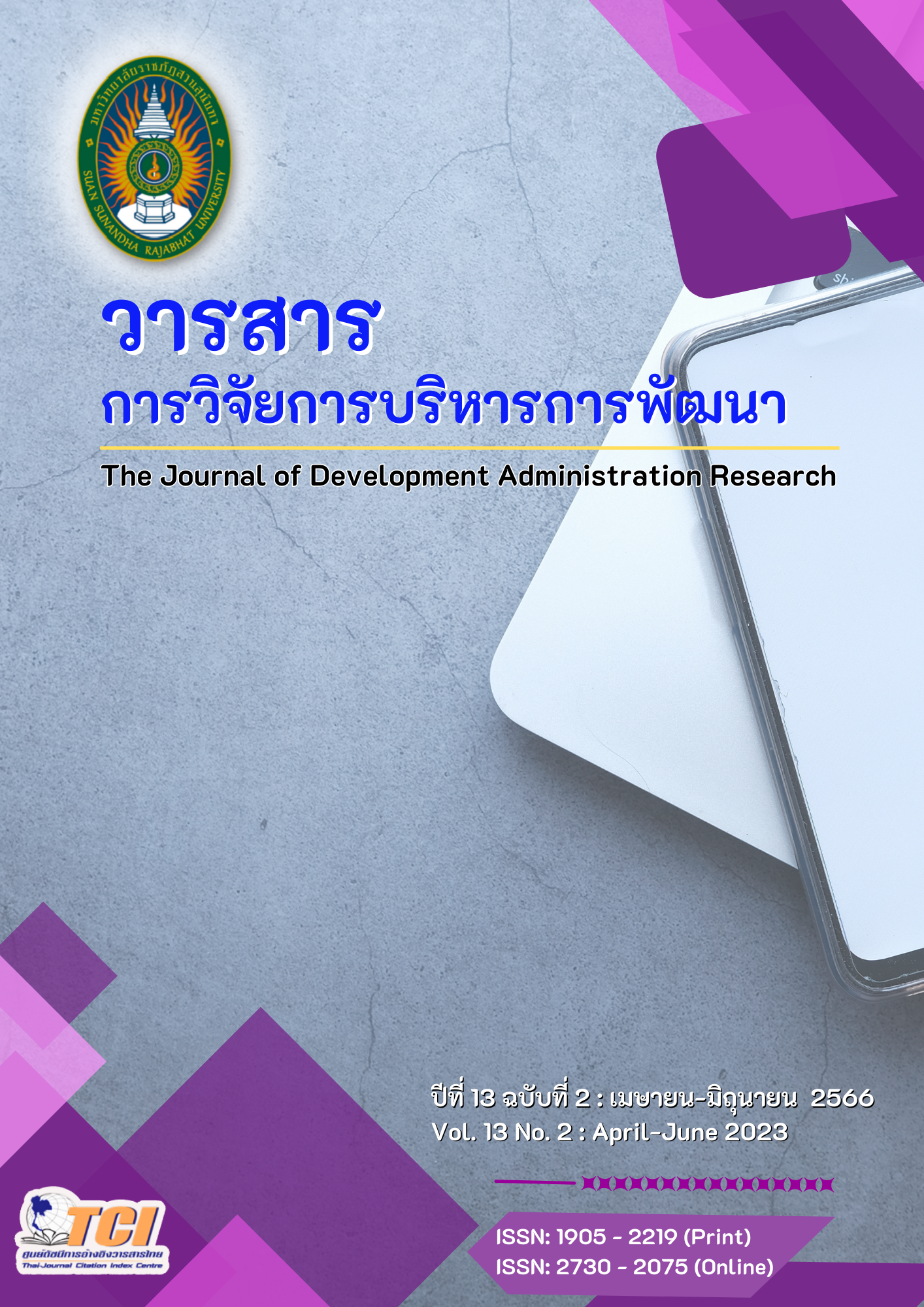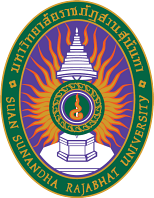ปัจจัยเชิงสาเหตุที่ส่งผลต่อการจัดการความรู้และประสิทธิภาพส่วนบุคคล ของส่วนราชการในสำนักนายกรัฐมนตรี
คำสำคัญ:
การจัดการความรู้, เทคโนโลยี, โครงสร้างองค์การ, วัฒนธรรมแบบราชการ, ประสิทธิภาพส่วนบุคคลบทคัดย่อ
บทความนี้มีวัตถุประสงค์เพื่อ 1) ศึกษาปัจจัยเชิงสาเหตุที่ส่งผลต่อการจัดการความรู้ของส่วนราชการในสำนักนายกรัฐมนตรี 2) เพื่อศึกษาอิทธิพลของการจัดการความรู้ที่ส่งผลต่อประสิทธิภาพส่วนบุคคลของส่วนราชการในสำนักนายกรัฐมนตรี และ 3) สร้างแบบจำลองของปัจจัยเชิงสาเหตุที่ส่งผลต่อการจัดการความรู้และประสิทธิภาพส่วนบุคคลของส่วนราชการในสำนักนายกรัฐมนตรี โดยใช้แนวคิดจากปัจจัยด้านเทคโนโลยี โครงสร้างองค์การ วัฒนธรรมแบบราชการ การจัดการความรู้ และประสิทธิภาพส่วนบุคคล เป็นกรอบการวิจัย กลุ่มตัวอย่าง คือ บุคลากรผู้ปฏิบัติงานของส่วนราชการในสำนักนายกรัฐมนตรี จำนวน 390 คน การวิจัยครั้งนี้เป็นการวิจัยเชิงปริมาณและเชิงคุณภาพ เครื่องมือที่ใช้ในการวิจัย คือ เครื่องมือที่ใช้เก็บรวบรวมข้อมูล ได้แก่ แบบสอบถามออนไลน์ และสถิติที่ใช้ในการวิเคราะห์ข้อมูล ได้แก่ สถิติเชิงพรรณนาและสถิติแบบจำลองสมการโครงสร้าง ผลการวิจัยพบว่า
1. ปัจจัยทางด้านเทคโนโลยี โครงสร้างองค์การ วัฒนธรรมแบบราชการ ส่งผลต่อการจัดการความรู้ของส่วนราชการในสำนักนายกรัฐมนตรี
2. อิทธิพลของการจัดการความรู้ที่ส่งผลต่อประสิทธิภาพส่วนบุคคลของส่วนราชการในสำนักนายกรัฐมนตรีมีค่าอิทธิพลที่มีนัยสำคัญทางสถิติที่ระดับ 0.05
3. แบบจำลองของปัจจัยเชิงสาเหตุพบว่าการจัดการความรู้ส่งผลต่อประสิทธิภาพส่วนบุคคลของส่วนราชการในสำนักนายกรัฐมนตรี
ข้อค้นพบจากงานวิจัยนี้ คือ ได้แบบจำลองเชิงสาเหตุและได้เครื่องมือในการสำรวจการจัดการความรู้และวัดระดับประสิทธิภาพส่วนบุคคลของส่วนราชการในสำนักนายกรัฐมนตรี เป็นแหล่งอ้างอิงให้แก่ผู้ที่สนใจในการพัฒนาส่วนราชการในสำนักนายกรัฐมนตรี โดยเฉพาะในด้านกระบวนการจัดการความรู้ เพื่อเสนอแนะจัดทำเป็นแผนปฏิบัติราชการต่อไปในอนาคต และเป็นเครื่องมือในการพัฒนาสมรรถนะขององค์การให้มีประสิทธิภาพ
เอกสารอ้างอิง
ทศพร ศิริสัมพันธ์. (2549). การจัดการความรู้ เพื่อพัฒนาระบบราชการไทย. ค้นเมื่อ 9 มีนาคม 2566, จาก http://inded.rmutsv.ac.th/main/sites/default/files/2KS%20DL_01.pdf
สำนักงานบริหารและพัฒนาองค์ความรู้. (2558). การจัดการความรู้ (KM) คืออะไร?. ค้นเมื่อ 9 มีนาคม 2566, จาก http://www.okmd.or.th/upload/pdf/chapter1_kc.pdf
Abu-Shanab, E., & Shehabat, I. (2018). The influence of knowledge management practices on e-government success: A proposed framework tested. Transforming Government: People, Process and Policy, 14(3/4), 286-308.
Adnan, H. M., & Mohamed, N. (2000). A Literature Survey on Knowledge Management and Public Organisations. Proceeding of 1st International Conference on Human Capital and Knowledge Management.
Alshahrani, A. (2018). Critical success factors of knowledge management in higher education institutions: a comparative study between Western Sydney University in Australia and King Fahd Security College in Saudi Arabia (Doctoral dissertation). Western Sydney University (Australia).
Armstrong-Flemming, B. E. (2015). The relationship between knowledge management practices and organizational performance within public sector organizations: A Caribbean perspective (Doctoral dissertation). Capella University.
Baker, A. M. (2018). An Investigation of the Interaction between Organizational Culture and Knowledge Sharing through Socialization: A Multi-Level Perspective (Doctoral dissertation). Nova Southeastern University.
Choi, S. Y., Lee, H., & Yoo, Y. (2010). The impact of information technology and transactive memory systems on knowledge sharing, application, and team performance: A field study. MIS quarterly,34(4), 855-870.
Chugh, M., Chanderwal, N., Upadhyay, R., & Punia, D. K. (2020). Effect of knowledge management on software product experience with mediating effect of perceived software process improvement: An empirical study for Indian software industry. Journal of Information Science, 46(2), 258-272.
Fitria, H., Mukhtar, M., & Akbar, M. (2017). The effect of organizational structure and leadership style on teacher performance in private secondary school. International Journal of Human Capital Management, 1(02), 101-112.
Gold, A. H., Malhotra, A., & Segars, A. H. (2001). Knowledge management: An organizational capabilities perspective. Journal of management information systems, 18(1), 185-214.
Haag, S. (2015). Appearance of Dark Clouds? - An Empirical Analysis of Users' Shadow Sourcing of Cloud Services. Wirtschaftsinformatik Proceedings, 96.
Haag, S., Eckhardt, A., & Bozoyan, C. (2015). Are shadow system users the better IS users? –insights of a lab experiment.Proceedings of the 36th International Conference on Information Systems (ICIS).
Johari, J., & Yahya, K. K. (2009). Linking organizational structure, job characteristics, and job performance construct: A proposed framework. International journal of business and management, 4(3), 145-152.
Kihara, A. S. N., Ngugi, P. K., & Ogollah, K. (2016). Influence of dynamic capabilities on performance of large manufacturing firms in Kenya. International Journal of Business Strategies, 1(1), 106-126.
Ladd, D. A. (2002). An Investigation of Environmental Factors that Influence Knowledge Transfer in the Air Force. Theses and Dissertations. 4474.
Li, M. (2015). The relationships bewtween organizational culture, knowledge productivity and value creation (Master's thesis). University of Twente.
Mallmann, G. L., & Maçada, A. C. G. (2021). The mediating role of social presence in the relationship between shadow IT usage and individual performance: a social presence theory perspective. Behaviour & Information Technology, 40(4), 427-441.
Massingham, P. (2014). An evaluation of knowledge management tools: Part 1–managing knowledge resources. Journal of knowledge management, 18(6), 1075-1100.
Mischen, P. A. (2015). Collaborative network capacity. Public Management Review, 17(3), 380-403.
Mohd Yunus, A., Kamal Rafedzi, E. R., & Ismail, N. (2021). Knowledge management: an approach of social media for crisis response management during pandemic Covid-19. Journal of Information and Knowledge Management, 11(2), 224-238.
Nwakoby, N. P., Okoye, J. F., & Anugwu, C. C. (2019). Effect of organizational culture on employee performance in selected deposit money banks in Enugu State. Journal of Economics and Business, 2(4),1213-1225.
O'Reilly, N. J., & Knight, P. (2007). Knowledge management best practices in national sport organisations. International Journal of sport management and marketing, 2(3), 264-280.
Smaliukiene, R., Bekešiene, S., Chlivickas, E., & Magyla, M. (2017). Explicating the role of trust in knowledge sharing: a structural equation model test. Journal of Business Economics and Management, 18(4), 758-778.
Yamane, T. (1967) Statistics: An Introductory Analysis. 2nd Edition. New York: Harper and Row.
Vasileiadis, I. & Fragouli, E. (2020). A methodological framework for evaluating knowledge management in the public sector: a case study. BAM 2020 Conference: Innovating for a Sustainable Future, 02-04 Sep 2020, Manchester, UK (Held online).
ดาวน์โหลด
เผยแพร่แล้ว
รูปแบบการอ้างอิง
ฉบับ
ประเภทบทความ
สัญญาอนุญาต
ลิขสิทธิ์ (c) 2023 วารสารการวิจัยการบริหารการพัฒนา

อนุญาตภายใต้เงื่อนไข Creative Commons Attribution-NonCommercial-NoDerivatives 4.0 International License.
บทความที่ได้รับการตีพิมพ์เป็นลิขสิทธิ์ของมหาวิทยาลัยราชภัฏสวนสุนันทา
ข้อความที่ปรากฏในบทความแต่ละเรื่องในวารสารวิชาการเล่มนี้เป็นความคิดเห็นส่วนตัวของผู้เขียนแต่ละท่านไม่เกี่ยวข้องกับมหาวิทยาลัยราชภัฏสวนสุนันทา และคณาจารย์ท่านอื่นๆ ในมหาวิทยาลัยฯ แต่อย่างใด ความรับผิดชอบองค์ประกอบทั้งหมดของบทความแต่ละเรื่องเป็นของผู้เขียนแต่ละท่าน หากมีความผิดพลาดใดๆ ผู้เขียนแต่ละท่านจะรับผิดชอบบทความของตนเองแต่ผู้เดียว




